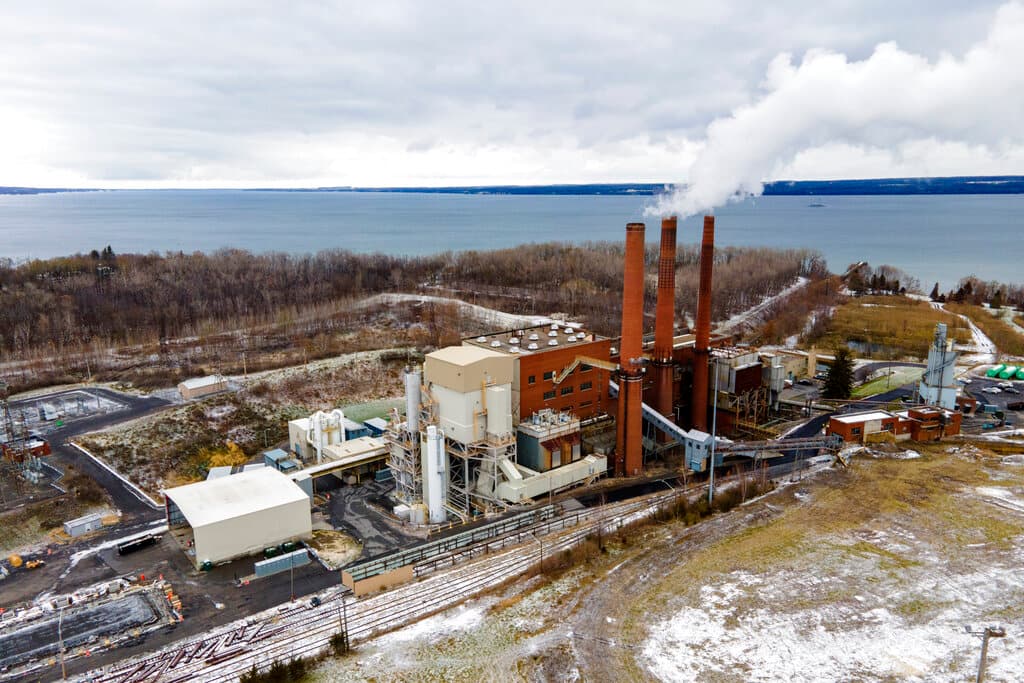New York Punts on Cryptomining Permit Decision
The delay pushes the decision deadline two days past New York’s party primary date. Activists pinned the blame on Governor Hochul.

Activists and lawmakers expressed outrage and disappointment Friday after state regulators delayed a permitting decision over an upstate power plant being used to “mine” cryptocurrency.
The delay — pushing the decision deadline two days past New York’s party primary date — means the plant will continue operations for now. Activists pinned the blame on Governor Hochul, though the regulatory agency denied politics was a factor.
“We knew Governor Hochul was a Buffalo Bills fan — we didn’t know she was a NFL caliber punter,” the legislative counsel at New York Public Interest Research Group, Russ Haven, said. “It’s a digital printing press hiding as a power plant.”
Greenidge Generation runs the gas-fired plant on the banks of Seneca Lake about 15 miles south of Geneva. The facility was originally permitted as a power plant, and while it does generate electricity, most of it is used to mine Bitcoin.
The plant’s emissions permits were up for renewal on Thursday. Critics contend they should not be extended because the plant operates under a certificate of public convenience and necessity.
This type of certificate is generally reserved for utilities. Greenidge Generation made no references to Bitcoin mining — an incredibly electricity-intensive process — in its application for the certificate.
Opposition to the plant has drawn together a broad coalition of agriculturalists, environmentalists, and business owners in the Finger Lakes region.
“This is squarely in Governor Hochul’s camp,” activist Liz Moran said of the Department of Environmental Conservation’s decision to back the ruling until June 30. “It has become a political decision.”
Another activist, Yvonne Taylor, said it was “clearly, nakedly” a political move. She said she was “happy to see” the New York City public advocate, Jumaane Williams, a Democratic gubernatorial candidate, come out in opposition to renewal of the permits.
A spokeswoman for the Department of Environmental Conservation, Maureen Wren, disagreed with the activists who called the delay politically motivated.
Ms. Wren said the agency’s “determination to further review the facility’s newly submitted proposal and materials was solely its decision.” She added “DEC has the sole authority to make a determination regarding this facility’s Title V Air Permit, as dictated by regulation and statute.”
“The additional time for review is not unusual for such an application, which includes the review of the approximately 4,000 public comments received,” Ms. Wren said. She added “DEC would never fast track any permit decision that could potentially impact public health and the environment.”
The activists for months have been pushing for a New York State moratorium on so-called proof of work cryptomining — in which computers solve puzzles to obtain units of cryptocurrency.
Ms. Moran pointed to “legislative momentum on the moratorium”
She is referring to two bills, one in each house of the state legislature, that would place a moratorium on proof of work cryptomining. Neither bill has been scheduled for debate.
Proof of work cryptomining is incredibly energy intensive. The Greenidge facility is estimated to use as much energy as between 100,000 and 130,000 average New York homes.
Greenidge is a Bitcoin mining plant and generated over 100 coins last year. Bitcoin is currently worth over $46,000 per coin.
“Thousands of elected officials, scientists, and concerned citizens alike submitted their comments and deserve a decision,” Assemblywoman Anna Kelles said. “This action to once again delay the decision on the Greenidge air and water permits is incredibly disappointing and appears to be politically motivated.”
The Greenidge operation is the first of its kind in the state and the nation, and those who study the topic believe that others will follow soon.
The conservation department’s permitting decision is seen as a possible watershed for the future of cryptocurrency in New York and the United States.

